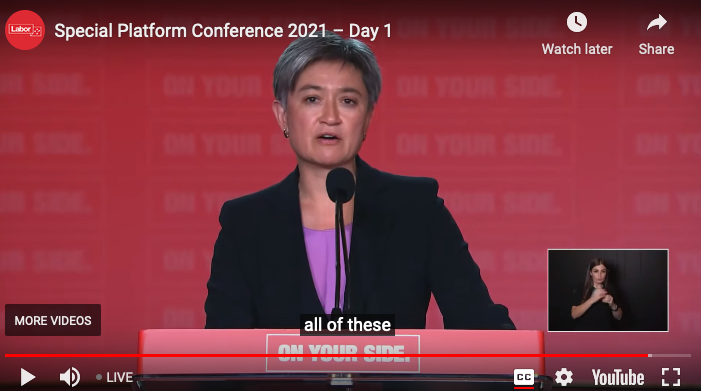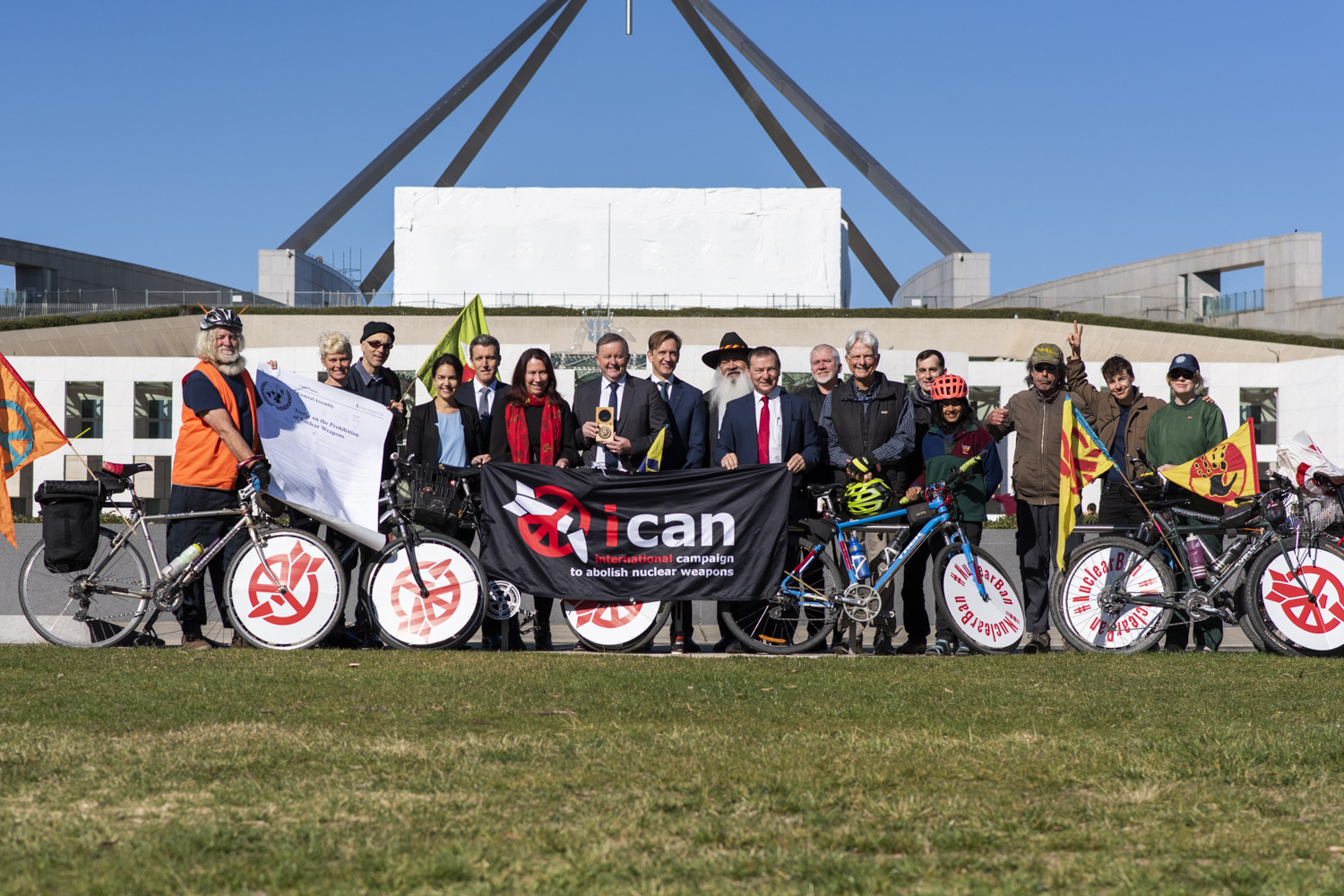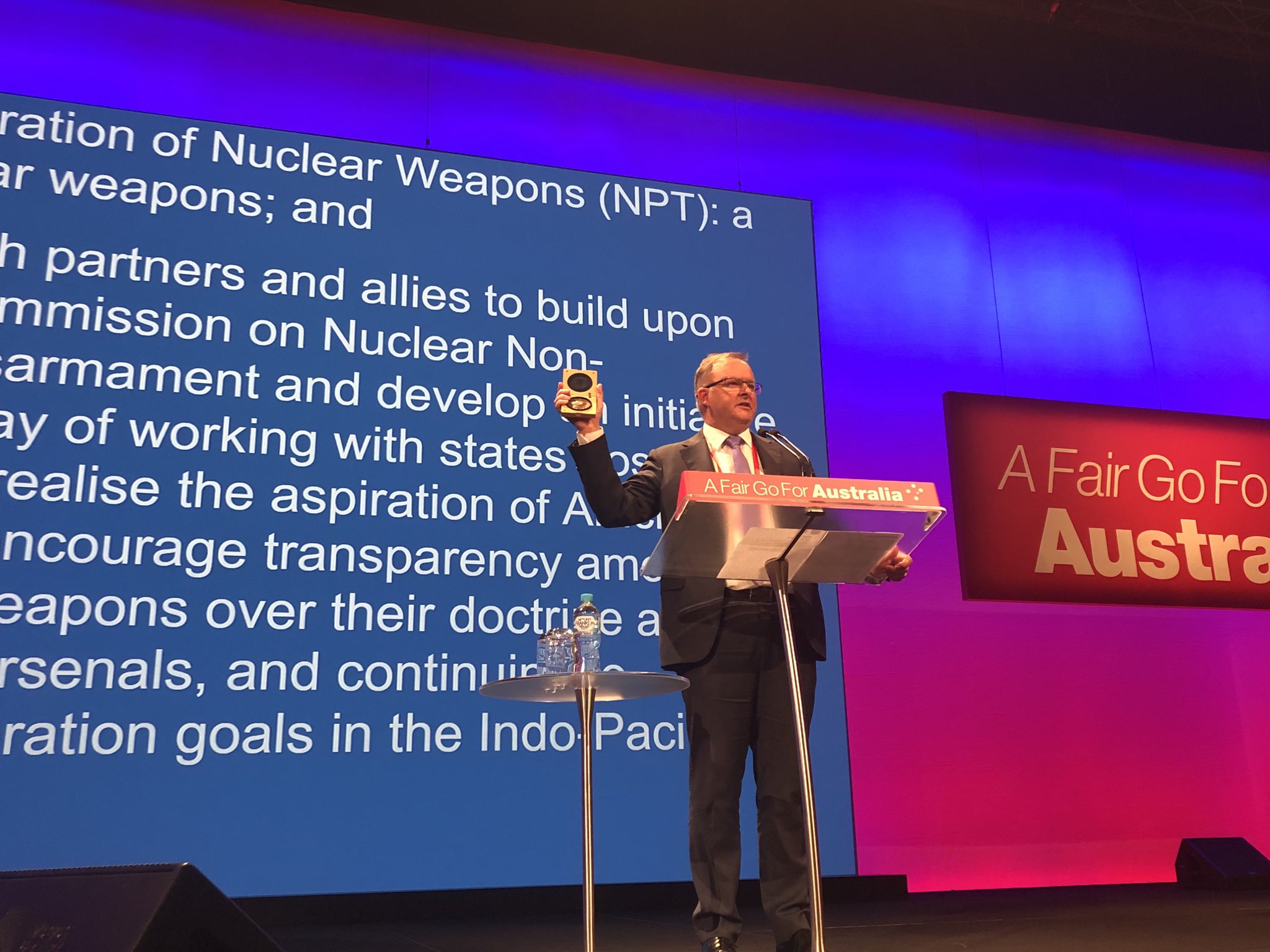Labor Policy and the Treaty on the Prohibition of Nuclear Weapons
Support for nuclear disarmament has deep roots in the Australian Labor Party. The legacy of Labor peace activists like Tom Uren endures, from Labor’s role in ratifying the Non-Proliferation Treaty in 1973, to implementing the Canberra Commission in 1995, through to the leadership of one of the Treaty’s strongest supporters, Anthony Albanese.
Labor first committed to signing and ratifying the Treaty on the Prohibition of Nuclear Weapons (TPNW) at its National Conference in 2018, reaffirming that commitment in 2021 and in 2023.
Within a month of its election in 2022, the Albanese Labor Government made the decision to formally observe the First Meeting of States Parties to the UN Treaty on the Prohibition of Nuclear Weapons in June 2022. Australia also observed the Second Meeting of States Parties from 27 November – 1 December 2023. Susan Templeman MP was the head of the Australian delegation for both meetings.
In October 2022, Australia for the first time abstained from voting on an annual UN General Assembly resolution that welcomes the adoption of the TPNW and calls upon all states to sign, ratify, or accede to it “at the earliest possible date”. This move formally brought an end to five years of Australian opposition to the treaty. This abstention was repeated in 2023.
In April 2023 the Foreign Minister said the TPNW has “substantial normative value“. Regarding the interaction of the NPT and TPNW, she said “In terms of the TPNW, I think the fact that so many states have signed it demonstrates the frustration that there has been insufficient progress in the context of the NPT, and if this can spur more progress in that arena, that is a good thing.”
The government has said that Australia is “considering the TPNW systematically and methodically as part of our ambitious agenda to advance nuclear non-proliferation and disarmament“.
LABOR PLATFORM 2023
Statement in Detail
Nuclear Disarmament
1. Acknowledges the growing danger that nuclear weapons pose to us all and the urgent need for progress on nuclear disarmament.
2. Acknowledges the deep and ongoing consequences of nuclear testing in Australia, which have been borne disproportionately by our First Nations peoples, as well as testing in the Pacific.
3. Commits itself to redoubling efforts towards a world without nuclear weapons and strengthening the non-proliferation regime.
4. Congratulates the International Campaign to Abolish Nuclear Weapons (ICAN) on its work in returning to global prominence the cause of nuclear disarmament;
5. Acknowledges the value of the Treaty on the Prohibition of Nuclear Weapons (the Ban Treaty) which came into force on 22 January 2021,and its aspiration to rid the world of nuclear weapons for all time;
6. Welcomes the positive steps taken by the Albanese Labor Government to engage with the Ban Treaty, including by sending an observer to the first Meeting of States Parties to the TPNW in Vienna, June 2022 and changing Australia’s vote on the annual UNGA resolution on the TPNW in 2022 from ‘oppose’ to ‘abstain’ and encourages attendance at the second Meeting in New York, November 2023.
7. Acknowledges the centrality of the US Alliance to Australia’s national security and strategic policy.
8. Labor in government will sign and ratify the Ban Treaty, after taking account of the need to:
a) Ensure an effective verification and enforcement architecture;
b) Ensure the complementary interaction of the Ban Treaty with the longstanding Nuclear Non-Proliferation Treaty;
c) Work to achieve universal support for the Ban Treaty.
9. Labor will take urgent action to reduce the risk of nuclear war by continuing its proud record of seeking nuclear disarmament and non-proliferation by:
a) Contributing to global progress towards addressing the matters outlined in paragraph 8 by;
b) Advocating to the United States that it actively negotiates with Russia, China and other nuclear armed states to develop a follow-on treaty to the New START treaty with a view to realising the objective of Article VI of the Treaty on the Non -Proliferation of Nuclear Weapons (NPT), namely, a world free of nuclear weapons;
c) Seeking to work with partners and allies to build upon the International Commission on Nuclear Non-Proliferation and Disarmament to develop an initiative which proposes a way of working with states possessing nuclear weapons to achieve Article VI of the NPT and encouraging transparency among all states with nuclear weapons in relation to their use doctrine and the composition of their arsenals, while continuing to strengthen non-proliferation goals in the Indo Pacific region; and
d) Considering steps that can be taken with respect to further assistance for affected communities and further environmental remediation in relation to the British atomic tests that occurred on Australian territory, consistent with Article 6 of the Ban Treaty, and considering further collaboration and assistance to Pacific Island communities affected by nuclear testing in the Pacific, consistent with Article 7 of the Ban Treaty.
Adopted unanimously on 19 August 2023 at the National Labor Conference.
LABOR PLATFORM 2021
Mover: Senator Penny Wong (SA)
Seconder: Brendan O’Connor MP (VIC)
Statement in Detail
Nuclear disarmament
Congratulates the International Campaign to Abolish Nuclear Weapons on its work in returning to global prominence the cause of nuclear disarmament;
Acknowledges the value of the Treaty on the Prohibition of Nuclear Weapons (the Ban Treaty) and its aspiration to rid the world of nuclear weapons for all time; and
Acknowledges the centrality of the US Alliance to Australia’s national security and strategic policy. Labor in government will sign and ratify the Ban Treaty, after taking account of the need to:
- Ensure an effective verification and enforcement architecture;
- Ensure the interaction of the Ban Treaty with the longstanding Nuclear Non-Proliferation Treaty;
- Work to achieve universal support for the Ban Treaty. Labor will take urgent action to reduce the risk of nuclear war by continuing its proud record of seeking nuclear disarmament by:
- Working to create the conditions necessary to achieve a pathway to universal support for the Ban Treaty;
- Advocating to the United States and Russia for the renewal of the New START (Strategic Arms Reduction Treaty) Treaty for the period beyond 2021;
- Advocating to the United States that it actively negotiates with Russia, China and other nuclear armed states a follow on treaty to the New START treaty with a view to realising the objective of Article VI of the Treaty on the Non -Proliferation of Nuclear Weapons (NPT): a world free of nuclear weapons; and
- Seeking to work with partners and allies to build upon the International Commission on Nuclear Non-Proliferation and Disarmament and develop an initiative which proposes a way of working with states possessing nuclear weapons to realise the aspiration of Article VI of the NPT seeking to encourage transparency among all states with nuclear weapons over their doctrine and the composition of their arsenals, and continuing to strengthen non-proliferation goals in the Indo Pacific region.
LABOR PLATFORM 2018
Resolution 397R
Chapter 11
Nuclear disarmament
Mover: Anthony Albanese (NSW)
Seconder: Richard Marles (VIC)
Labor:
- Congratulates the International Campaign to Abolish Nuclear Weapons on its work in returning to global prominence the cause of nuclear disarmament;
- Acknowledges the value of the Treaty on the Prohibition of Nuclear Weapons (the Ban Treaty) and its aspiration to rid the world of nuclear weapons for all time, and;
- Acknowledges the centrality of the US Alliance to Australia’s national security and strategic policy.
Labor in government will sign and ratify the Ban Treaty, after taking account of the need to:
- Ensure an effective verification and enforcement architecture;
- Ensure the interaction of the Ban Treaty with the longstanding Nuclear Non-Proliferation Treaty;
- Work to achieve universal support for the Ban Treaty.
Labor will take urgent action to reduce the risk of nuclear war by continuing its proud record of seeking nuclear disarmament by:
- Working to create the conditions necessary to achieve a pathway to universal support for the Ban Treaty;
- Advocating to the United States and Russia for the renewal of the New START (Strategic Arms Reduction Treaty) Treaty for the period beyond 2021;
- Advocating to the United States that it actively negotiates with Russia, China and other nuclear armed states a follow on treaty to the New START treaty with a view to realising the objective of Article VI of the Treaty on the Non-Proliferation of Nuclear Weapons (NPT): a world free of nuclear weapons; and
- Seeking to work with partners and allies to build upon the International Commission on Nuclear Non-Proliferation and Disarmament and develop an initiative which proposes a way of working with states possessing nuclear weapons to realise the aspiration of Article VI of the NPT seeking to encourage transparency among all states with nuclear weapons over their doctrine and the composition of their arsenals, and continuing to strengthen non-proliferation goals in the Indo-Pacific region.
LABOR PLATFORM 2015
Note: the Treaty on the Prohibition of Nuclear Weapons was negotiated and adopted in 2017.
Chapter 11: Australia’s place in a changing world
Maintaining our national security
- Prohibiting and eliminating nuclear weapons is a humanitarian imperative. Civil society and non-government organisations in Australia and internationally who form the global movement to secure a ban on nuclear weapons do important work. Labor will act with urgency and determination to rid the world of nuclear weapons.
- Given the catastrophic humanitarian consequences of any use of nuclear weapons, Labor firmly supports the negotiation of a global treaty banning such weapons and welcomes the growing global movement of nations that is supporting this objective.
TIMELINE OF LABOR’S PROGRESS TOWARDS JOINING THE TPNW
27 November – 1 December 2023: Australia attends the Second Meeting of States Parties to the Treaty on the Prohibition of Nuclear Weapons as an observer, with Susan Templeman MP again heading up its delegation.
19 August 2023: At its National Conference, Labor reaffirms its commitment to sign and ratify the TPNW in government. It also agrees to consider steps on nuclear weapon victim assistance and environmental remediation, consistent with Articles 6 and 7 of the treaty.
17 April 2023: At the National Press Club the Foreign Minister Penny Wong said the TPNW has “substantial normative value” and that if it can “spur more progress” in the NPT, “that is a good thing”.
24 February 2023: NSW Labor confirms that it “supports the Albanese Government’s position to sign and ratify the Ban Treaty... Labor is committed to acting with urgency and determination to rid the world of biological, chemical and nuclear weapons.”
28 October 2022: In the first committee of the UN General Assembly, Australia abstains for the first time on an annual resolution urging all countries to join the TPNW. Under the Coalition government, Australia had voted “no”.
21–23 June 2022: Following the election of a federal Labor government on 21 May, Australia attends the first meeting of states parties to the TPNW in Vienna as an observer. Susan Templeman, a Labor parliamentarian, heads the official delegation.
2 October 2021: Western Australian Labor adopts a resolution welcoming the TPNW’s entry into force and urging federal Labor “to commit to consider, sign and ratify the treaty in the first term of an elected federal Labor government”.
30 March 2021: At a special platform conference, federal Labor reaffirms its commitment to sign and ratify the TPNW in government.
23 January 2021: Federal Labor welcomes the entry into force of the TPNW. Albanese and Wong reiterate: “We have committed to signing and ratifying the treaty after taking account [of] the need to ensure an effective verification and enforcement architecture, interaction of the treaty with the Nuclear Non-Proliferation Treaty, and achieving universal support.”
25 October 2020: In a statement issued by Albanese and Penny Wong, federal Labor welcomes the 50th nation ratifying the TPNW – the threshold required for its entry into force – and congratulates ICAN “for the significant milestone”.
17 November 2019: Victorian Labor adopts a resolution reaffirming Victoria’s nuclear-free status and urging federal Labor to “begin discussion on resolving issues relating to Australia joining the [TPNW]”.
19 October 2019: Northern Territory Labor adopts a resolution asking the next Labor national conference “to reaffirm its commitment to sign and ratify the [TPNW] immediately upon taking up government”.
12 October 2019: South Australian Labor adopts a resolution urging federal Labor to begin discussions on resolving issues relating to the TPNW “with a view to Australia signing the treaty as soon as possible”.
25 August 2019: Western Australian Labor adopts a resolution calling on the Australian government “to sign and ratify the [TPNW] as an urgent humanitarian imperative”.
20 July 2019: Australian Capital Territory Labor adopts a resolution urging federal Labor “to make a firm commitment to sign and ratify the [TPNW] when Labor next forms government”.
18 December 2018: Albanese submits a motion to Labor’s national conference in Adelaide committing the party to sign and ratify the TPNW in government. “I don’t argue that this is easy. I don’t argue that it’s simple. But I do argue that it’s just,” he says. The motion is adopted with unanimous support.
20 September 2018: Marking the first anniversary of the TPNW’s opening for signature, Albanese addresses a rally of activists in Canberra who had ridden 900 kilometres from Melbourne. He thanks ICAN for promoting “locally, nationally and internationally” the importance of a world free of nuclear weapons.
9 September 2018: Tasmanian Labor adopts a resolution calling on federal Labor “to make a firm commitment to sign and ratify the [TPNW] when Labor next forms government”. It says that “Australia joining the nuclear ban treaty is an essential step on the path towards the total elimination of nuclear weapons”.
3 August 2017: Following the adoption of the TPNW by 122 countries on 7 July, Albanese becomes one of the first politicians in the world to sign ICAN’s parliamentary pledge – a personal commitment to work for Australia’s signature and ratification of the treaty.
28 March 2017: As negotiations for the Treaty on the Prohibition of Nuclear Weapons (TPNW) commence in New York, Albanese expresses regret at Australia’s absence: “I think the Australian people will be disappointed that Australia is choosing to not even participate in the forum.”
9 November 2016: Albanese welcomes the decision of the UN General Assembly to commence negotiations in 2017 on a “legally binding instrument to prohibit nuclear weapons” and urges the Coalition government to “stop working to undermine this process”.
12 February 2015: Anthony Albanese MP, together with 837 other parliamentarians from 42 countries, signs an ICAN appeal calling on governments to negotiate “a treaty banning nuclear weapons and leading to their complete eradication”.
Anthony Albanese MP holds ICAN’s Nobel Peace Prize medal while moving the resolution to commit a future Labor Government to signing and ratifying the Treaty on the Prohibition of Nuclear Weapons, 18 December 2018. Read the speech here.

Senator Penny Wong moves Chapter 7, including nuclear disarmament, at the national Special Platform Conference, 30 March 2021.

Labor parliamentarians welcome the arrival of the ICAN Nobel Peace Ride in Canberra after cycling 900km from Melbourne, 18 September 2018.

